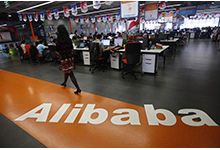Alibaba Group Holding’s decision to conduct its huge IPO in the US has dashed hopes that Hong Kong might become a thriving listing hub for internet stocks. A US$15bn IPO from the Chinese e-commerce giant in Hong Kong could have stemmed the flow of Chinese companies rushing to list in the US, and been a magnet to pull in other similar stocks from the region.
Alibaba’s size and weighting in the Hang Seng Index would have forced technology analysts and investors to pay more attention to the Stock Exchange of Hong Kong and that could also have brought more attention to smaller companies listed on the bourse.
Instead, Alibaba chose the US, which has been a hotbed of equity raisings for Chinese internet companies since the middle of last year.
“It’s a disappointment for everybody,” said one Hong Kong ECM banker, but he pointed out that tech companies that had already started work on IPOs would not change their plans to list in the city.
“I don’t think there will be a huge impact on the timetables for the other smaller deals. We are still very hopeful,” the banker added.
This year, games developer Locojoy and Tiange Group, as well as online components shop Cogobuy are planning to undertake Hong Kong IPOs, but none is expected to be larger than US$300m. Bigger deals, such the US$600m IPO of Jumei.com and the US$1.5bn float of JD.com, are already planned for the US.
An Alibaba IPO would have attracted a flurry of other Chinese tech listings to Hong Kong, but deals of that type will now probably continue to head for the US, as they have done traditionally, another market observer said.
Door left open
However, Alibaba has left the door open for a listing in either Hong Kong or China at a later date. A listing near its home base would allow the company to remain part of the tech-stock boom in the region.
“Should circumstances permit in the future, we will be constructive towards extending our public status in the China capital market in order to share our growth with the people of China,” the company said in a statement.
The company also said it would “support the process of innovation and development of Hong Kong”. That could be a reference to the Hong Kong market rules that hampered its SEHK listing.
Alibaba wanted to list in Hong Kong, but the SEHK was not willing to relax its regulations on shareholder structures. The company had wanted to keep its partnership structure, which gives founding shareholders and senior managers more control, despite their minority stakes.
“Should circumstances permit in the future, we will be constructive towards extending our public status in the China capital market”
It is not unusual for tech companies, such as Google, to grant more control to founders by using dual-class shares with different voting rights, but the structure is not permitted in Hong Kong.
While the SEHK was unwilling to compromise its governance standards to meet the demands of one trophy listing, the bourse’s operator said the exchange might need to amend its listing requirements in the future to adapt to the particular needs of tech companies.
“We are proud of our tradition of respect for the rule of law and adherence to principles. However, we also need to find ways to make our market more responsive and competitive, particularly with respect to new economy or technology companies,” said Charles Li, CEO of Hong Kong Exchanges and Clearing, after Alibaba’s US listing plans emerged.
“We have to consider possible changes where they might be necessary, with everything according to our due process,” Li said. “The Listing Committee’s work on shareholding structures didn’t start because of Alibaba and will not end now because of Alibaba.”
Credit Suisse and Morgan Stanley have started work on Alibaba’s US IPO under the code name Project Avatar, IFR reported last week. Citigroup, Deutsche Bank, Goldman Sachs and JP Morgan are also poised for leading roles on the deal.
Alibaba and its shareholders, including Yahoo, are expected to raise over US$15bn in an IPO that values the group at more than US$100bn.
